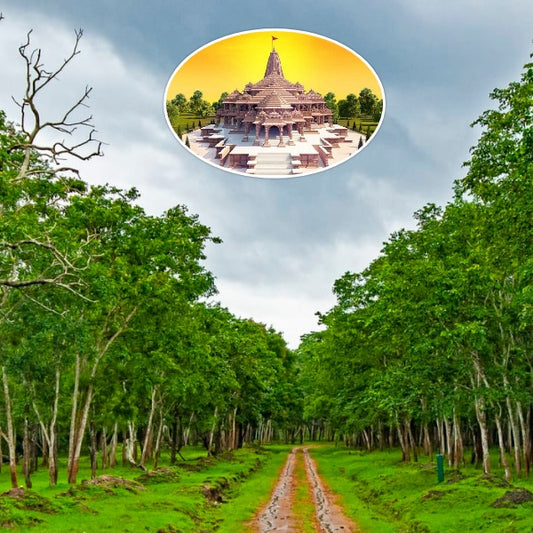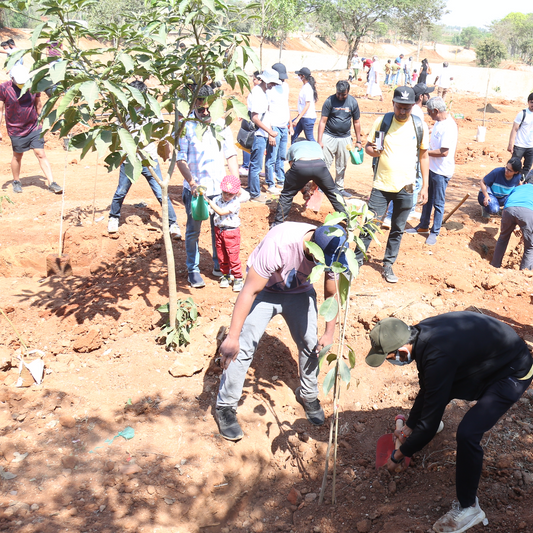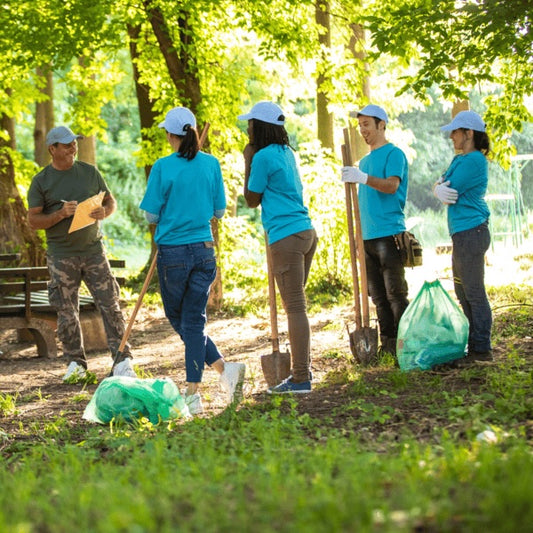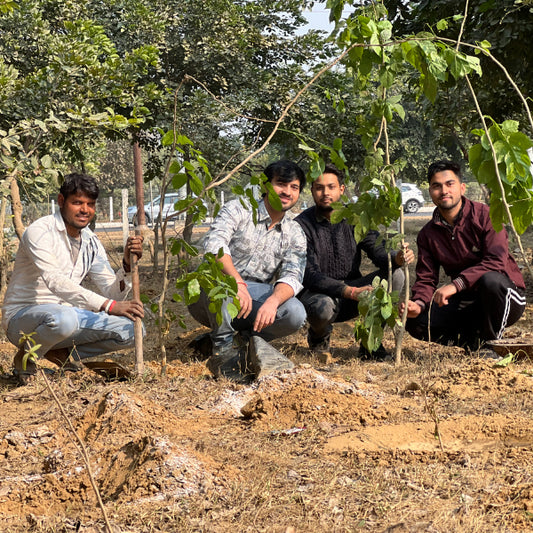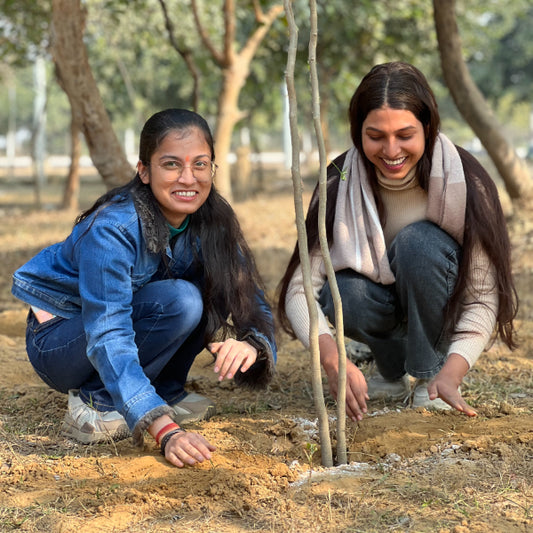Cultivating Green Spaces: Bajaj Allianz General Insurance’s Dual Appro
Bajaj Allianz General Insurance has embarked on a dual-concept tree plantation initiative, embracing both urban forest and agroforestry models to supp Read more
Cultivating Green Spaces: Bajaj Allianz General Insurance’s Dual Approach to Urban and Agroforestry
Bajaj Allianz General Insurance has embarked on a dual-concept tree plantation initiative, embracing both urban forest and agroforestry models to support environmental sustainability. Through this initiative, a total of 11,000 trees have been planted, reflecting the company’s commitment to restoring ecosystems, enhancing biodiversity, and fostering a greener future.
Urban Forestry
At Baner Hills, the company has created an urban forest by planting 500 trees, transforming an open space into a dense green oasis. This urban forest concept at Baner is designed to boost local biodiversity, improve air quality, and provide a green retreat for the community while enhancing the urban ecosystem. The urban plantation serves as a natural habitat for local flora and fauna, demonstrating a commitment to creating thriving green spaces within city landscapes.
Agroforestry
In Satara, the initiative extends to an agroforestry model by planting 10,500 trees, integrating trees within agricultural land. Here, Bajaj Allianz General Insurance collaborates closely with farmers to plant trees alongside crops, fostering a balance between productive farming and environmental stewardship. This agroforestry approach enriches soil fertility, aids water retention, and creates a sustainable ecosystem that supports local agriculture while absorbing carbon dioxide.
Through these twin plantation efforts, Bajaj Allianz General Insurance advances its commitment to environmental resilience and community well-being, paving the way for greener, more sustainable landscapes across both urban and rural settings.
Tree Plantation Date
Urban Forest: 28th Sep 2024 to 28th Oct 2024
Agroforestry: 7th Oct 2024 to 5th Nov 2024
Tree Plantation Location
Urban Forest: Pan Card Clubs area, Vasundhara Abhiyan Baner Next to Reelicon Alpine Ridge, Baner, Pune, Maharashtra 411045
Agroforestry: Girvi, Phaltan, Satara - 415523
Trees Planted
Agroforestry
Total Trees Planted: 10,500
Species Planted: Mango, Guava, Anjeer, Lemon
Urban Forest
Total Trees Planted: 500
Species Planted: Neem, Indian Rosewood, Indian Laburnum, Jamun, Rain Tree, Indian Almond, Indian Cork Tree, Flame of the forest, Indian Coral tree, Cluster fig, Indian Cork Fig, Mahua, Wild Almond , Indian Cork Oak
Forest Type: Urban Forest & Agroforestry
Urban forests and agroforestry plantations are powerful green solutions for sustainable land use and environmental health.
Urban forests create dense pockets of greenery within cities, improving air quality, reducing noise, and providing essential habitats for urban wildlife. These forests bring nature closer to communities, offering a natural escape while fighting pollution and heat.
Agroforestry, on the other hand, integrates trees within agricultural landscapes, enhancing soil fertility, conserving water, and creating diverse income opportunities for farmers. By planting trees alongside crops, agroforestry supports sustainable agriculture, boosts biodiversity, and strengthens the resilience of rural ecosystems against climate change.
Both approaches offer meaningful, long-term benefits for environmental and community well-being.
Advantages of Tree Plantation
Urban forests enhance city life by improving air quality, cooling surroundings, reducing noise, and supporting local wildlife. These green spaces combat urban heat, foster biodiversity, and provide peaceful areas for community well-being and outdoor activities, making cities healthier and more livable.
Agroforestry revitalizes rural agriculture by integrating trees with crops, enhancing soil fertility, preventing erosion, and retaining moisture. It sequesters carbon, aids climate mitigation, and supports biodiversity. Economically, it diversifies farmers’ income through resources like fruits and timber, stabilizes food supplies, and strengthens rural livelihoods. This sustainable approach ensures productive farmland, resilient ecosystems, and long-term benefits for communities.
Tree Plantation Purpose
Bajaj Allianz General Insurance (BAGIC) has undertaken a transformative tree plantation initiative, planting 11,000 trees to foster environmental sustainability and social well-being. This project adopts a dual-concept approach: 10,500 trees planted in an agroforestry model in Girvi, Satara, and 500 trees established in an urban forest model at Baner, Pune.
The agroforestry model integrates trees with agricultural systems, delivering numerous ecological and economic benefits. It enhances biodiversity, improves soil health, and increases crop yields while empowering farmers with sustainable livelihoods. This approach supports SDG 1 (No Poverty), SDG 2 (Zero Hunger), SDG 5 (Gender Equality), SDG 12 (Responsible Consumption and Production), SDG 13 (Climate Action), SDG 15 (Life on Land), and SDG 17 (Partnerships for the Goals) by fostering community collaboration and responsible land use.
The urban forest model focuses on restoring greenery in urban landscapes, improving air quality, reducing heat island effects, and enhancing urban biodiversity. These forests also provide serene green spaces for community engagement and mental well-being, contributing to SDG 3 (Good Health and Well-being), SDG 11 (Sustainable Cities and Communities), SDG 13 (Climate Action), and SDG 15 (Life on Land).
This initiative exemplifies BAGIC's dedication to its ESG (Environmental, Social, and Governance) goals, aligning rural and urban sustainability efforts to create a lasting legacy for future generations.
Commitment by Grow Billion Trees
Grow Billion Trees is committed to driving sustainable plantation efforts, ensuring every initiative aligns with key environmental objectives and promotes long-term ecological balance. We focus on selecting native tree species that are well-adapted to local ecosystems, ensuring a higher survival rate and stronger environmental impact.
To maintain plant health and longevity, Grow Billion Trees emphasizes continuous maintenance and regular monitoring of the plantations. This approach helps ensure that each tree thrives, contributing effectively to both biodiversity and climate resilience.
Transparency is a core principle in our operations. Clients receive comprehensive reports, including geo-tagging of planted trees, survival rate updates, and ongoing progress reports. This level of openness allows clients to track the direct impact of their contributions, reinforcing trust and accountability.
Through our dedication to sustainable practices, Grow Billion Trees ensures that every plantation project leaves a lasting positive footprint on both the environment and the local communities it serves.
Summary
Bajaj Allianz General Insurance has taken a meaningful step toward environmental sustainability with a tree plantation initiative that combines urban forestry at Baner Hills and agroforestry at Satara.
This dual approach promotes biodiversity, enhances air quality, and combats climate change, reflecting the company’s commitment to greener practices. The urban forest at Baner Hills transforms the cityscape with green cover, cooling, and cleaner air, while the agroforestry plantation in Satara supports local farmers with sustainable agricultural practices that improve soil health and provide diversified income.
Together, these efforts foster healthier ecosystems and a more sustainable future for communities.
Trending
Trees for Corporates
FAQ
What is the purpose of Bajaj Allianz’s tree plantation initiative?
Bajaj Allianz’s tree plantation initiative aims to enhance environmental sustainability through agroforestry and urban forestry. By planting trees in both urban and rural areas, the initiative targets improved air quality, biodiversity conservation, and carbon sequestration. The project also supports local farmers, creates green urban spaces, and promotes climate resilience, reinforcing Bajaj Allianz's commitment to environmental and social responsibility.
How does Bajaj Allianz’s agroforestry project benefit farmers?
The agroforestry initiative benefits farmers by integrating trees with their existing crops. This improves soil fertility, reduces the need for chemical fertilizers, and provides an additional income source through timber, fruits, and other tree products. By diversifying farm revenue and enhancing soil health, this approach helps farmers cultivate sustainable, resilient farms that can adapt to climate challenges.
What is the urban forest initiative at Baner Hills about?
The urban forest initiative at Baner Hills is a project by Bajaj Allianz to create a green lung in the urban environment. Through dense tree planting, this project aims to reduce air pollution, provide cooler spaces, and promote biodiversity within the city. The urban forest not only benefits the environment but also offers a green space for community members, enhancing the overall quality of life.
How does Bajaj Allianz contribute to carbon sequestration with these initiatives?
By planting trees in agroforestry and urban forest settings, Bajaj Allianz actively contributes to carbon sequestration. Trees absorb carbon dioxide, reducing greenhouse gases in the atmosphere. Through these projects, the company supports India’s climate action goals, aiming to offset emissions and mitigate climate change by fostering green growth and sustainable ecosystems.
What role do employees play in Bajaj Allianz’s tree plantation efforts?
Employees at Bajaj Allianz participate in tree plantation activities, making them active contributors to the company’s green mission. By involving employees in planting trees and maintaining green spaces, the initiative builds environmental awareness and engagement. These activities provide a unique bonding experience, fostering teamwork and creating a shared sense of responsibility for the environment among employees.
How does the tree plantation initiative support biodiversity?
Bajaj Allianz’s tree plantation initiative supports biodiversity by incorporating a variety of native tree species. This promotes local ecosystems, providing habitats for birds, insects, and other wildlife. Both the urban forest and agroforestry projects aim to create rich, diverse environments that enhance biodiversity, improve soil health, and promote ecological balance, benefiting the entire ecosystem.
What are the long-term goals of Bajaj Allianz’s green initiatives?
The long-term goals include promoting environmental sustainability, improving local ecosystems, and supporting India’s efforts toward climate resilience. Bajaj Allianz aims to create self-sustaining green spaces, boost carbon sequestration, and foster biodiversity. The initiatives focus on creating lasting environmental and social impact, aligning with the company’s broader commitment to responsible corporate practices and sustainable development.
Why did Bajaj Allianz choose both agroforestry and urban forestry approaches?
By choosing both agroforestry and urban forestry, Bajaj Allianz addresses sustainability in both rural and urban areas. Agroforestry supports farmers by improving soil health and providing income sources, while urban forestry creates green spaces that benefit city dwellers. This dual approach ensures a holistic impact, helping conserve nature in diverse environments and promoting greener, healthier communities.
How does the tree plantation initiative align with Bajaj Allianz’s CSR goals?
This initiative aligns closely with Bajaj Allianz’s Corporate Social Responsibility (CSR) goals by promoting sustainable development and environmental stewardship. Through these plantation efforts, the company addresses climate change, supports community well-being, and engages in meaningful ecological impact. This approach not only benefits local communities but also reinforces Bajaj Allianz’s dedication to being a socially responsible organization.
How can the public get involved in Bajaj Allianz’s green initiatives?
While the primary participants are Bajaj Allianz employees and local communities, public engagement is welcome through awareness campaigns and collaborations with environmental organizations. The company encourages community members to participate in local green initiatives, adopt sustainable practices, and promote environmental awareness. By spreading the word, the public can join hands with Bajaj Allianz in building a greener, more sustainable future for all.
Population Plantation Drives
Corporate Planting Drive
Connect with us
-
👥 Corporates
If you are looking for:
- 🌲 Tree Plantation Events
- 📊 CSR Projects
📧 corporate@growbilliontrees.com
📞 +91 9699723523
💬 +91 9370599291 WhatsApp (Only)
🕒 Mon - Sat | 10am - 7pm IST
-
🧩 Tree Plantation NGOs
If you are looking for:
- 💰 Financial Assistance
- 🤝 Operational Support
📧 support@growbilliontrees.com
📞 +91 9699723523
💬 +91 9370599291 WhatsApp (Only)
🕒 Mon - Sat | 10am - 7pm IST
-
🌼 Individuals
If you are looking for:
- 👥 Group Tree Plantation Drive
- 🌳 Bulk Tree Plantation
📞 +91 9699723523
💬 +91 9370599291 WhatsApp (Only)
🕒 Mon - Sat | 10am - 7pm IST







